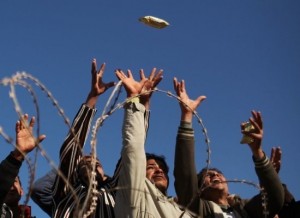 NOTE: While I wrote this post three years ago, it is more relevant today than ever. I just got off the phone with a national leader who works with refugees and he described how his organization gets waves of new refugees after each international crisis. Currently, Syrians and Iraqi’s are pouring in, each with their own traumas, stories and humanity. The UN recently announced that 51.2 million people were forcibly displaced in 2013.
NOTE: While I wrote this post three years ago, it is more relevant today than ever. I just got off the phone with a national leader who works with refugees and he described how his organization gets waves of new refugees after each international crisis. Currently, Syrians and Iraqi’s are pouring in, each with their own traumas, stories and humanity. The UN recently announced that 51.2 million people were forcibly displaced in 2013.
———————
When pending or actual war invades the headlines of our news outlets and personal attention, we sometimes forget one of war’s worst casualties; displaced civilians. In Libya alone, 75,000 people fled the country between February 19th and March 11th. Tens of thousands waited and continue to wait at the border seeking protection from their war torn homeland.
So what happens to them once they escape the war and oppression of their homeland?
Simply put, they become refugees who most likely will never be able to return to the life they once lived. A migrant is one to leaves their country seeking socio-economic recovery, most often because of their homeland is experiencing oppression is some way. In contrast, a refugee is fleeing physical persecution, oppression and/or war. Death is an immediate reality.
When a refugee escapes their oppressive homeland, they most often have to live in a refugee camp awaiting resettlement in a more developed country. While they keep their physical life, their daily reality is remains in dyer straights. Sometimes refugees live in these camps for up to 20 years awaiting resettlement.
My wife and I work with a refugee family from Somalia each week. After fleeing persecution in Somalia, they lived in a refugee camp in Kenya for years waiting for resettlement. They are now in San Diego (which is a resettlement city) living in a crowded apartment complex alongside refugees from dozens of other countries. The family we work with has 8 members and lives in a tiny two-bedroom apartment.
While modern day refugees have escaped physical death, they have experienced profound social and relational death. First, they have been forced from their physical homes and the rich culture/heritage that make them up. Second, a refugee family is NOT resettled alongside the rest of their extended family. The family of our Somalian friends are now scattered all over the U.S. and Europe. With their modest income, seeing the family they grew up with is now close to impossible.
The casualty of war that is often overlooked is that of the refugee’s loss of “home.” Everything they would equate with “home” has been taken (physical home, family relationships, culture, etc…). It is no wonder that refugee’s often cling to their last symbol of “home” in the form of their inherited religion/tradition. Without a physical setting or extended family, their identity is now only found in such tradition.
For this reason our friends from Somalia quickly cover their heads when we come to their door, have passages from the Quran on their wall and obey a certain diet. Their tradition is all they have left and it offers them the security of “home.”
From early in the Story, YHWH commanded his people to make a “home” for the foreigner within their community and tradition. Jesus always had a special place for the deserted outcast and socio-political refugee. May those that follow Jesus (and those that don’t) mourn the casualty of the loss of “home” for those fleeing Libya today. And may we honor their traditions while offering them a “home” within ours.
How can we help?
- THIS is a good article with some suggestions
- Follow the International Rescue Commission and/or UN Refugee Agency on Twitter to keep up to date
- Get connected with local organizations that resettle refugees and help them in their transition to a new “home” – See the IRC and UN Refugee Agency websites for more info
- Pray and advocate for the stories of the refugees to be told and considered in time of conflict